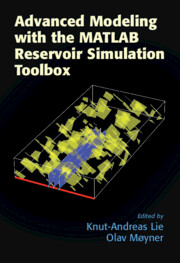Book contents
- Frontmatter
- Contents
- List of Contributors
- Preface
- Acknowledgments
- Navigating the Book and the MRST Modules
- Part I Grid Generation, Discretizations, and Solvers
- Part II Rapid Prototyping and Accelerated Computation
- 5 Better AD Simulators with Flexible State Functions and Accurate Discretizations
- 6 Faster Simulation with Optimized Automatic Differentiation and Compiled Linear Solvers
- Part III Modeling of New Physical Processes
6 - Faster Simulation with Optimized Automatic Differentiation and Compiled Linear Solvers
from Part II - Rapid Prototyping and Accelerated Computation
Published online by Cambridge University Press: 20 November 2021
- Frontmatter
- Contents
- List of Contributors
- Preface
- Acknowledgments
- Navigating the Book and the MRST Modules
- Part I Grid Generation, Discretizations, and Solvers
- Part II Rapid Prototyping and Accelerated Computation
- 5 Better AD Simulators with Flexible State Functions and Accurate Discretizations
- 6 Faster Simulation with Optimized Automatic Differentiation and Compiled Linear Solvers
- Part III Modeling of New Physical Processes
Summary
Many different factors contribute to elapsed runtime of reservoir simulators. Once the cases become larger and more complex, the required wait time for results can become prohibitive. This chapter discusses three features recently introduced into the MRST AD-OO framework to make simulation of large cases more efficient. By analysing the sparsity pattern of the Jacobians for some of the most common operations involved in computing residual flow equations, we have developed different implementations of automatic differentiation that offer better memory usage and requires fewer floating point operations. Using these so-called AD backends ensures (much) faster assembly of linearized systems. Likewise, these systems can be solved much faster by utilizing external packages for linear algebra; herein, primarily represented by the AMGCL header-only C++ library for solving large sparse linear systems with algebraic multigrid (AMG) methods. Last, but not least, the new ``packed problem'' format simplifies the management of multiple simulation cases and enables automatic restart of simulations and an ability for early inspection of results from large batch simulations. Altogether, these features are essential if you are working with bigger simulation models and want timely results that persist across MATLAB sessions.
Keywords
Information
- Type
- Chapter
- Information
- Advanced Modeling with the MATLAB Reservoir Simulation Toolbox , pp. 200 - 254Publisher: Cambridge University PressPrint publication year: 2021
- Creative Commons
- This content is Open Access and distributed under the terms of the Creative Commons Attribution licence CC-BY-NC-ND 4.0 https://creativecommons.org/cclicenses/
Accessibility standard: Unknown
Why this information is here
This section outlines the accessibility features of this content - including support for screen readers, full keyboard navigation and high-contrast display options. This may not be relevant for you.Accessibility Information
- 3
- Cited by
